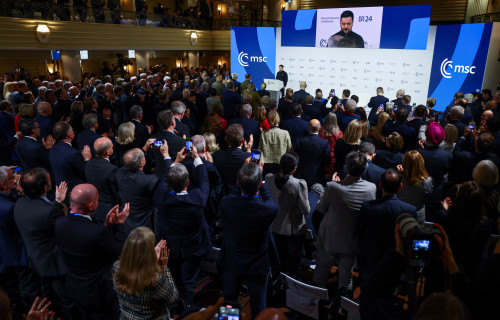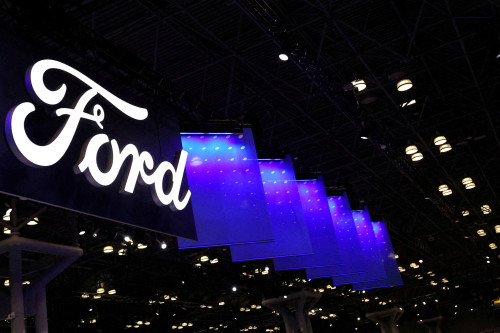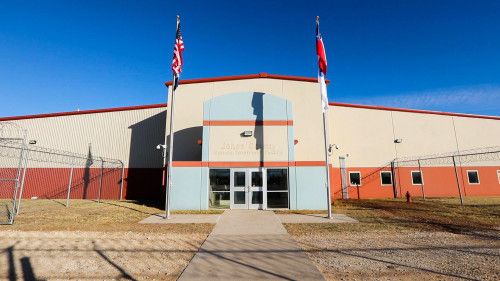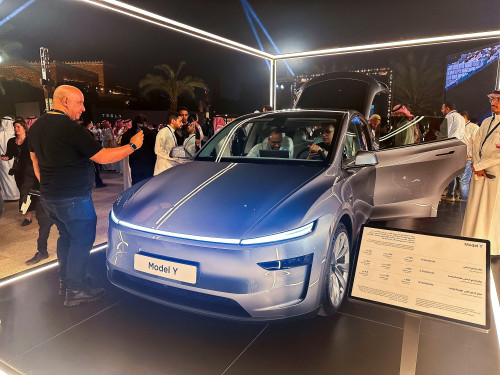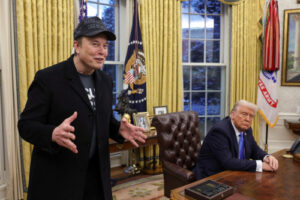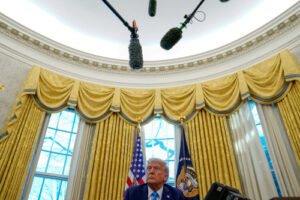By Andrew Gray, John Irish and Lili Bayer
MUNICH (Reuters) – They should not have been surprised. Yet European officials have been left shocked and flat-footed by the Trump administration’s moves on Ukraine, Russia and European defence in recent days.
At a major security conference in Munich at the weekend, there was a sense of dismay and disbelief – and a whiff of panic – among European delegates even as some tried to put a brave face on a dizzying few days of declarations and diplomacy.
Chief among their fears: that they can no longer be sure of U.S. military protection and that U.S. President Donald Trump will do a Ukraine peace deal with Russian President Vladimir Putin that undermines Kyiv and broader European security.
That concern was stoked by U.S. Vice President JD Vance’s conference speech, which mentioned Ukraine and European defence only in passing and focused on accusing Europe of stifling free speech and failing to manage migration.
European leaders declared they would have to take more responsibility for their own defence, ramping up military spending and arms production.
But after years of such statements during Trump’s first term in 2017-21, and after Russia’s 2022 invasion of Ukraine, they have yet to agree on how to organise such an effort or how to pay for it.
They are also under U.S. pressure to come up with plans for security guarantees for Ukraine, which a group of leaders will discuss at a hastily arranged summit in Paris on Monday.
The Europeans’ fears of being sidelined were heightened by Trump’s Ukraine envoy, retired Lieutenant General Keith Kellogg, who declared on Saturday they would not be at the table for peace talks – although their views would be taken into account.
Later in the day, it emerged that U.S. and Russian officials will meet in Saudi Arabia in the coming days to start talks aimed at ending the war.
U.S. officials have insisted they will only settle for a “durable” peace deal and Ukraine will be at the table.
But, meeting in Munich, a city synonymous with the 1938 pact to let Nazi Germany annex the Sudetenland region of Czechoslovakia, some European leaders at the security conference said openly they feared appeasement was once again on the agenda.
“As I stand here in Munich tonight, I cannot help but ask: Have we been here before?” European foreign policy chief Kaja Kallas said on Saturday evening.
Polish Prime Minister Donald Tusk chimed in remotely on Sunday via X: “As a historian and politician the only thing I can say today is: MUNICH. NEVER AGAIN.”
EUROPEANS REELING
Europeans are reeling from a blizzard of Trump administration moves in recent days, even as Washington has said it remains committed to the NATO transatlantic alliance that has been the bedrock of European security for 75 years.
On Wednesday, new U.S. Defense Secretary Pete Hegseth declared at NATO headquarters that a peace deal would not include NATO membership and it was unrealistic for Ukraine to return to its borders pre-2014, when Russia annexed Crimea.
Hegseth also said “stark strategic realities” prevented the U.S. “from being primarily focused on the security of Europe”.
Later that day, Trump said he had called Putin, gave an upbeat assessment of the conversation and said peace talks would start immediately.
Trump’s action upended years of Western policy, pursued by the Biden administration and European powers, of trying to isolate Putin and insisting peace talks should only begin when Ukraine was in a stronger position on the battlefield.
Many of these steps had been telegraphed by Trump in his presidential election campaign and had strong echoes from his first term, when he frequently criticised NATO and accused Europeans of failing to spend enough on defence.
But they have left European leaders frantically playing catch-up.
Having spent months debating possible European security guarantees for Ukraine, they have been pushed to act by an American diplomatic demand to detail what they could provide.
Two European leaders also called on Sunday for the European Union to designate a special envoy for Ukraine peace talks – several months after Trump named his own.
Still, many European officials expressed puzzlement as they tried to discern whether the Trump administration had a detailed plan for Ukraine and who the key players were.
Some drew hope from discussions with U.S. officials behind the scenes, which they said were more sober and constructive than the blunt public remarks from Vance, Hegseth and others.
But others said they feared for the transatlantic alliance as a whole, arguing the Trump administration was not just pursuing different policies from Europe but was actively opposed to the European political mainstream.
On Friday, Vance met leaders of the far-right Alternative for Germany (AfD), which is shunned by mainstream parties, ahead of a national election on February 23.
“It is clear now that the U.S. wants to break the post-World War Two order that they created. And that includes destroying the EU. We will have to be prepared for that and change our attitude completely,” said one European diplomat.
(Additional reporting by Andreas Rinke, Ingrid Melander and Charlotte Van Campenhout; editing by Mark Heinrich)

